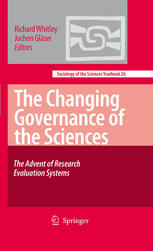

Most ebook files are in PDF format, so you can easily read them using various software such as Foxit Reader or directly on the Google Chrome browser.
Some ebook files are released by publishers in other formats such as .awz, .mobi, .epub, .fb2, etc. You may need to install specific software to read these formats on mobile/PC, such as Calibre.
Please read the tutorial at this link: https://ebookbell.com/faq
We offer FREE conversion to the popular formats you request; however, this may take some time. Therefore, right after payment, please email us, and we will try to provide the service as quickly as possible.
For some exceptional file formats or broken links (if any), please refrain from opening any disputes. Instead, email us first, and we will try to assist within a maximum of 6 hours.
EbookBell Team

5.0
28 reviewsThe establishment of national systems of retrospective research evaluations is one of the most significant of recent changes in the governance of science. In many countries, state attempts to manage public science systems and improve their quality have triggered the institutionalisation of such systems, which vary greatly in their methods of assessing research performance, and consequences for universities. The contributions to this volume discuss, inter alia, the birth and development of research evaluation systems as well as the reasons for their absence in the United States, the responses by universities and academics to these new governance regimes, and their consequences for the production of scientific knowledge. By integrating new theoretical approaches with country studies and studies of general phenomena such as university rankings and bibliometric evaluations, the book shows how these novel state steering mechanisms are changing the organisation of scientific knowledge production and universities in different countries.
In combining latest research and an overview of trends in the changing governance of research, the book is essential not only for scholars engaged in higher education research, science policy studies, and the sociology of science but also for policy makers and analysts from science policy and higher education policy as well as university managers and senior scientists.